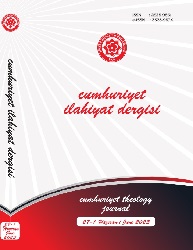Cumhuriyet Dönemi Dinî Yayınlarda Mucize Anlayışı (1924-1960)
The Understanding of Miracles in Religious Publications in the Republican Period (1924-1960) of Türkiye
Author(s): Abdurrahman AtalaySubject(s): Media studies, Political history, Religion and science , Politics and religion, Interwar Period (1920 - 1939), WW II and following years (1940 - 1949), Post-War period (1950 - 1989)
Published by: Cumhuriyet Üniversitesi İlahyat Fakültesi
Keywords: Kalam; Allah; Miracle; Reason; Nature; Causality; Science;
Summary/Abstract: It is possible to talk about many reasons that determine the direction of religious publications in the first quarter of the Republic, both in terms of content, style and method. While some of these factors came into play or became stronger with the Republic, an important part of it has a history that goes back to Ottoman modernization. The decline of the Ottoman state, which started on the battlefields, caused serious land losses. This regression damaged the self-confidence of Muslims and spread the idea that salvation would be possible with a Western-style modernization. In this context, the obligatory relations with the Western world, which were established with the feeling of backwardness, were not limited to the military, political and cultural fields, but also spread to the religious field. For this reason, while Ottoman scholars and thinkers sought ways out through political and administrative reforms, they had to discuss the current understanding of religion and the religionworld conception formed in this direction. It has been especially emphasized that Islam does not prevent progress, encourages scientific and technical developments, and is compatible with the principles of reason and logic in terms of content. It is also known that the emphases in this manner maintain their vitality in the texts written both in the last period of the Ottoman Empire and in the Republic of Turkey. On the other hand, this approach, which was not possible to develop independently of the positivist and materialist understanding of science formed in a determinist framework of the West, also affected the field of creed along with the practical and moral issues of Islam. This situation continued and strengthened when it was transferred to the republican period. Because the founding cadres of the republic, who sought a secular and positivist ground, defended the idea that the religious field in general and the creed in particular should not conflict with the scientific understanding of the period. Expressed in the context of the present study, the political center thinks that there are compulsory fixed laws within the framework of cause-effect relationship in nature and that no effect is possible outside of these laws. In response to this attitude, the issue of miracles has been used in religious publications to express situations that go above the laws of nature, on the one hand, it has been tried to be discussed without prejudice to the attributes and actions of Allah. On the other hand, this discussion was conducted without giving the impression that Islam contradicts modern science. Discussing the issue under the influence of the secular and positivist framework drawn by the political center and Western intellectuals makes the issue a worthwhile subject to investigate. Because, in the period of the New Ilm-i Kalam, the restrictive attitude of the founding cadres accompanied the rational and scientific interpretations about the possibility of miracles. This situation significantly determined the content and style of the texts written during the period. In these circumstances, I believe that it is important to point out the points of conflict and reconciliation in the grounding of a religious issue such as a miracle. In this direction, while the current study covers the years 1924- 1960 in terms of time, it is a study that especially includes the publications of the Presidency of Religious Affairs and Ankara University Faculty of Theology as a source. The date 1924, which was determined as the starting date, is important both for the establishment date in terms of the Presidency of Religious Affairs and for the abolition of the caliphate and the taking of some important decisions such as the Law on Unification of Education. On the other hand, the date of 1960 points to a coup date and some fractures in the political sense. During the study, I included the sources published by both the Presidency of Religious Affairs and the Faculty of Theology of Ankara University, as well as other sources directly related to these sources. In addition to this time and resource restriction, it was also referred to important texts written before 1924 and after 1960 when appropriate.
Journal: Cumhuriyet İlahiyat Dergisi
- Issue Year: 27/2023
- Issue No: 1
- Page Range: 196-208
- Page Count: 13
- Language: Turkish

